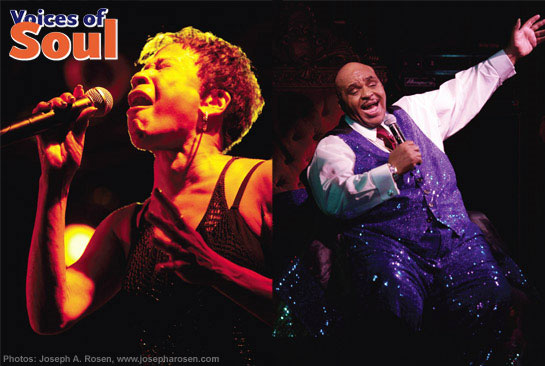
BETTYE LAVETTE
Born January 29, 1946, highly talented and (now) highly acclaimed soul singer Bettye LaVette was prevented from gaining wide recognition for years by what she calls “buzzard luck.” LaVette grew up in Detroit and was discovered at 16 by singer/producer Johnnie Mae Matthews. Shortly after, she released her first single, “My Man—He’s a Lovin’ Man,” (Atlantic), which cracked the R&B Top Ten. Her next single to chart, “Let Me Down Easy,” written by Dee Dee Ford in 1965, remains one of her signature tunes.
In 1972, after releasing singles for assorted labels, LaVette set about recording her first full-length album on Atlantic, which the label mysteriously shelved at the last second. She later recorded Tell Me a Lie, released in 1982. Afterward, she focused on live appearances, only recently returning to the studio.
Nearly 30 years after its inception, the long-lost Atlantic album was released in France by Gilles Petard with the title Souvenirs (2000). LaVette has gathered steam in this millennium, releasing A Woman Like Me, I’ve Got My Own Hell to Raise, and most recently, the Grammy-nominated The Scene of the Crime, on Antiin 2007.
LaVette records covers and tunes written for her. “I’m a better editor,” she says. “If you make a statement, I can make it a stronger statement. If you write a story, I can make it a stronger story.” She claims she learned inflection in her early 20s only at her late manager Jim Lewis’ insistence. Today, her intricate phrasing—for which she credits Lewis—has helped her thrive as a song interpreter, masterfully reinventing every song she undertakes.
LaVette is currently on tour and will appear this summer both on festival stages and on her own. (See Also Appearing for a review of her concert at Lincoln Center.)
SOLOMON BURKE
Dubbed the “King of Rock and Soul,” a mantle he upholds with relish, Solomon Burke was born on March 21, 1940. His career began to take off in the mid-1950s when he scored a minor hit, “You Can Run (But You Can’t Hide),” on Apollo Records. In 1960, Burke signed with Atlantic, where he released 32 singles, including “Just Out of Reach (Of My Two Open Arms),” “Cry to Me,” “If You Need Me,” “Got to Get You Off My Mind,” “Tonight’s the Night” and “Goodbye Baby (Baby Goodbye).” In 1968, Burke recorded “Soul Meeting” with Don Covay, Ben E. King, Arthur Conley, and Joe Tex. The Soul Clan, as they were called, considered their single an expression of solidarity.
Burke left Atlantic in 1969, recording albums at various labels in the 1970s, maintaining his gospel/soul roots steadfastly through the ’80s and ’90s, regularly touring and recording. He was inducted into the Rock and Roll Hall of Fame in 2001, and won a Grammy in 2002 for the landmark Don’t Give Up On Me, sparingly and effectively produced by Joe Henry; the CD included songs by Tom Waits, Bob Dylan, and Brian Wilson. His next, Make Do With What You Got, produced by veteran Don Was featured the horns and vocal backing of classic soul albums. In 2006, Burke released Nashville (a soul/country throwback to the roots of his early Atlantic singles) on Shout! Factory. Burke’s latest, Like A Fire, out in June, features collaborations with songwriters Ben Harper, Keb’ Mo’, Jesse Harris, Eric Clapton, and Steve Jordan. (See On the Record for a review.)
In addition to being one of America’s leading soul veterans, Burke is a bishop in the House of God for All People and formerly owned a chain of mortuaries. The mortuaries might be surprising, but his spiritual involvement isn’t: before his recording career, Burke was Philadelphia’s “Wonder Boy Preacher,” hosting his own gospel radio show. He truly is one of soul music’s greatest characters and greatest talents.
![]()
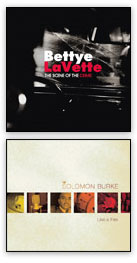 Elmore: What are you listening to right now?
Elmore: What are you listening to right now?
Bettye LaVette: Oh I don’t listen to music at all. But I can quote to you every word that’s been said since 9 o’clock this morning by everyone involved in both the campaigns.
My husband put a CD together for me of everything from the five years we’ve been together because he tries to encourage me to listen to music. He figures if he puts the Drifters, Johnny Hartman and Ray Charles all on a CD for me, then I at least wouldn’t turn it off. When I have a new CD, I’ll listen to it every day until it’s released. When it’s released, I listen to what everybody’s got to say about it but I don’t listen to it anymore. I was so surprised, I got in the car and one of the songs from I’ve Got My Own Hell To Raise came on and I just stopped for a moment and listened to it. I haven’t heard it in two years.
Solomon Burke: I’ve been listening to all new songs, different great classics and gospel songs, country gospel songs and some fantastic music. I’m going through about 600 songs and listening to a great variety of music. My favorite is John Legend, he’s fantastic.
EM: What was the first record you ever bought?
BL: “Rockin’ Robin” by Bobby Day. ‘Cause I was ten years old and it was things about birds—what am I gonna say, because his voice was so well-trained.
SB: A record by Ray Charles, “I Got A Woman, Way Cross Town, She’s Good To Me.” It was very hard to find because it had been out a long time before I ever had it. I went searching for it for like a month. I finally got it and a then a friend of mine gave it to me, so I had two of them.
EM: Where do you buy your music?
BL: I haven’t spent a dollar on a recording in your lifetime. My husband has ordered some things for me and if I say, “Oh I remember years and years ago I used to love…” he’ll look it up for me on the internet but I don’t seek out music and that isn’t what entertains me. We probably listen to music for two different reasons: when you like it you buy it; when I like it I sing it and that’s how I express my like for it.
SB: A lot of it, truthfully, I get off of the internet. Downloading to the iPod all the new things that are just totally exciting.
EM: Do you play an instrument?
BL: No, and I hate my husband ’cause he can play three and he’s not even in show business.
SB: I play some guitar and autoharp. The first guitar I had, given to me by my grandmother, was a Stella guitar in 1954 and that was before everybody else was born.
EM: Who would you like to write with that you haven’t?
BL: Nobody. There are too many songs out there that haven’t been done. I could probably record for another 20 years without anybody touching pen to paper because it’s my interpretation and that makes it a new song. Artists now think in terms of “this is my song, I sing it and that’s it,” and I feel like “this is your song until it becomes my song.” If they’re good songs, they need to be recorded more than twice. I don’t think of the song as another singer’s song, I think of it as a song—as words on a piece of paper. I think of it as “After Midnight,” not as Eric Clapton’s song. Now that’s arrogance!
SB: Gosh, that’s a fantastic question, I’d love to write with Aretha Franklin, wow, I would love to write with a lot of people. Willie Nelson is another one. Dr. Dre would be another guy I’d like to write with. That would be my idea of doing some incredible masterpieces.
Eric Clapton was a dream. Alone, he just comes up with things, you just have to go along with it, it’s just so fantastic and the direction of his songs are such great messages. That was a lot of fun. The Eric Clapton song, “Like a Fire,” was incredible. Then we wrote a gospel song together, so that’s been exciting.
EM: What musician influenced you most?
BL: I didn’t have a chance to have a lot of influences. My first record came out when I was 16 and prior to that I had never seen anyone on stage, so it was everything that I had ever heard. I wasn’t able to follow any one particular person. My husband tells me when he was seven or eight he started buying all the records by this person. We didn’t have any money to be buying any records. My family sold corn liquor during segregation in the ’40s, and there was a jukebox in my living room as opposed to a couch, and a couple of little tables for people to sit down and drink. I heard everything that was out because they stocked the jukebox with the current recordings, and I don’t think that any one person stuck out to me. As I got older people started to stick out, like Ray Charles and Etta James. No one in my family had ever done anything—I had no reason to think that I would ever be a singer, or do anything but eventually drop out of school and go to General Motors and get a job. I didn’t know what I did want to do but I knew I didn’t want to do that. Being in Detroit in ’62 just saved my life; I could have been a bank robber—just imagine the other things I could have chosen if music hadn’t been all around me.
SB: I would say Nat “King” Cole, Count Basie, Ray Charles—to me, they were incredible. I love Gene Autry too, so you’re gonna get a crazy interview from me. I always wondered what “Back in the Saddle” would sound like with Ray Charles doing it, with the Count Basie Orchestra behind him. That’s how my little mind always works when it comes to music—hearing the different sounds and feelings of a song and the different movements of the notes.
EM: What was the song or event that made you realize you wanted to be in music?
BL: When they said “You can sing and we’re gonna record you.” Up until that day I was a groupie; Timmy Shaw was a local singer in Detroit, and he was talking to me. I wasn’t thinking about being a singer, I was thinking about talking to him. As he began to sing, I started to sing along with him and he said, “You can sing!” I said, “I know.” Before that I didn’t think it was unique to be able to sing. I thought maybe it was a unique thing to be a star, or record; I thought probably everybody could sing, but just some of ’em made records. My mother could sing, she had never made any records.
Timmy Shaw’s manager and producer was Johnnie Mae Matthews. She might have been the first female producer, or certainly the first black female producer, but she was just such a wretched woman: she had everybody in Detroit before you heard of them, but she crossed us all, and fortunately Atlantic saved me from her. It was like from shit to sugar—I had absolutely nothing and here they’re saying “We’re going to let you stand up on the stage with those same people you saw last night at the Gravestone and sing with them and we’re gonna have a record and they’re gonna play it on the radio.” What was I gonna say, “No, I’d rather go back home”? I was 16! It was like a 16-year-old boy joining the NBA.
SB: That’s hard to say, I was born in the church, so music was all around me all the time and I just loved the sound. Our church consisted of trombones and tubas and bass, drums and pianos and electric guitars, steel guitars; it was very moving, very exciting, something I’ve heard all my life. I would have to say “99 1/2 Won’t Do” and “Old Ship of Zion” are two songs that I used to love listening to and still do, and was very moved by as a child.
EM: Who would you like in your rock and roll heaven band?
BL: The band that I have now because they aren’t anyone in the world, they’re my band. I’ve become more about “my.” This is the band I would want if I had my druthers. I like them because they make me sound good. I’m not a fan really on any level. I’m not gonna like your band because they make you sound good. I really don’t know a lot of musicians either, and most of the people that you know now who are considered great musicians, even saying Eric Clapton, when I started singing he wasn’t great so why would I sing 10 or 15 years and then have him suddenly be in my from heaven band. That doesn’t make sense for me. My dream thing would be for me and my band to be as big as he is.
I would love to have sung a song with Ray Charles, and I’d love to sing one with Willie Nelson but I’d rather have my band play it and I’d be assured to sound better than him. Those are the only two people, one dead, one living, that I would find any interest in singing along with. But now, please make note that I’m willing to sing with anybody they suggest that’s gonna help me make these steps a little faster, ’cause I’m old.
SB: I don’t make conjectures like that. I wouldn’t want to have a rock ‘n’ roll heaven band, I want to have a band here on earth.
EM: What’s your desert island CD?
BL: It would be all the black and white movies made between 1937 and 1940. After I sat there and listened to music closely, I’d probably take it and throw off in the ocean. I’m singing in my head all the time, and that was one of the things that helped me for 47 years—I wasn’t distracted by anything else.
SB: Alicia Keys, Christina Aguilera, and some great Ray Charles records, what a combination, huh? But it always would be the Etta James classic record At Last, it just stays in your heart and mind, no matter when you hear her sing it, you want to hear it again.


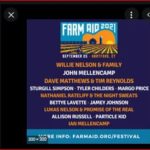
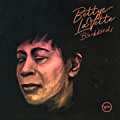

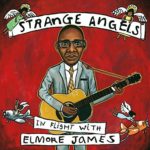

[…] January, as part of the annual Association of Performing Arts Presenters, LaVette graced the City Winery stage in New York City, bringing with her a talented host of friends, […]